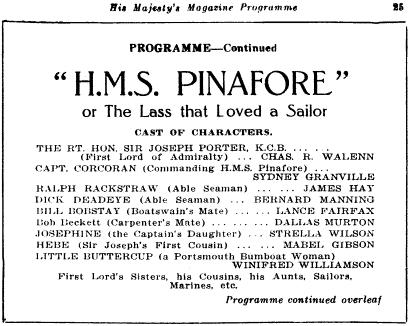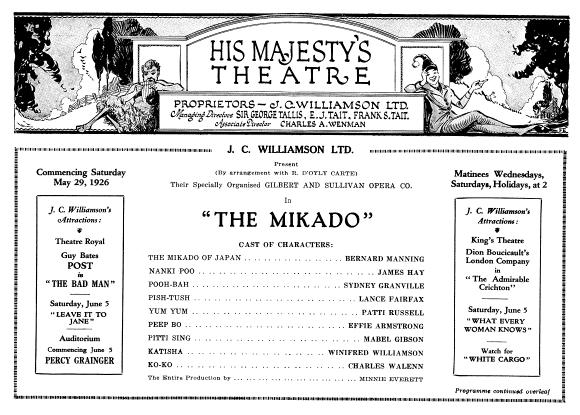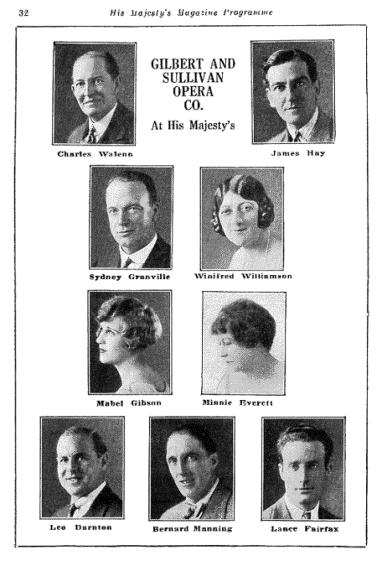Sydney Granville's 1926 Australasian Tour
Reported by Robert Morrison
Sydney Granville was born in Bolton, Lancashire (now Greater Manchester), in 1880 and started his singing career in grand opera with the Moody-Manners Opera Company. He first appeared with the D'Oyly Carte in 1907 and played Bill Bobstay in HMS Pinafore at the Savoy in 1908. Granville's early years with the company were spent playing juvenile baritone roles in the operas including Cox, Samuel, Grosvenor, Strephon, Florian, Pish-Tush, Sir Richard Cholmondeley, Luiz and Giuseppe.
In July of 1925 Granville went on tour with the D'Oyly Carte "New" Opera Company (the smaller provincial touring company), with which he appeared as the Colonel Calverley, Lord Mountararat, the Mikado and Sir Roderic Murgatroyd. Mid-way through the season, Granville left the company with a number of other principals and sailed to Australia to join the J. C. Williamson Gilbert & Sullivan Opera Company for its 1926–28 tour of Australia and New Zealand.
It was thus in Australia that Sydney Granville made his stage début in the 'heavy' baritone roles of Don Alhambra del Bolero, Wilfred Shadbolt, Sergeant of Police, Pooh-Bah, Private Willis, King Hildebrand and Captain Corcoran — yes, that's right, Captain Corcoran! Some reference books, (notably Wolfson's The Savoyards on Record), assert that "Sydney Granville never appeared in this role onstage" — this statement should be modified with the qualification: "What, never?" ... "We-ell, hardly ever" — only in Australia and New Zealand!" (Sorry, but I couldn't resist it!) Perhaps the biggest mystery is why Granville never appeared on stage as Corcoran in Britain as his Australian reviews were largely favourable.

|
Since the early 1880s there had existed close co-operation between J. C. Williamson Ltd. and the D'Oyly Carte to the extent that many former Savoyards and Savoyards who were "between contracts" were engaged for Australian G. & S. tours on the recommendation of the respective D'Oyly Cartes — hence Granville's Australasian experience was no doubt regarded as a 'trial-run' for playing the 'Pooh-Bah' roles with the D'Oyly Carte.
Incidentally, another example of the level of co-operation that existed between the two companies can be gauged from the fact that the G. & S. operas played in Australasia during the 1926–28 tour were re-costumed in accord with the same designs then in use by the D'Oyly Carte Opera Company, )with the exception of Charles Ricketts's "controversial" 1926 redressing of "The Mikado") — which were kindly supplied by Rupert D'Oyly Carte.
The J.C.W. G. & S. company began its tour at Adelaide's Theatre Royal, where it opened with The Gondoliers on 3rd April and The Yeomen of the Guard on 10th April 1926, after which it moved on to Melbourne, where the repertory season played at His Majesty's Theatre between 17th April and 27th July 1926 — the opening date of each opera being as follows:—
| The Gondoliers | 17th April |
| The Yeomen of the Guard | 1st May |
| The Pirates of Penzance | 15th May |
| The Mikado | 29th May |
| H.M.S. Pinafore / Trial by Jury | 19th June |
| Iolanthe | 3rd July |
| Princess Ida | 17th July 1926 |
(Patience was not added to the tour's repertoire until 19th March 1927 in Sydney, and Ruddigore received its belated Australian professional première in Adelaide on 23rd June 1927 — both productions opening after Granville had left the company, apparently at the conclusion of its New Zealand tour. The Sorcerer and Cox and Box were not performed on this tour.)
After Melbourne the company then toured to Brisbane for a season, followed by a trip across the Tasman Sea to New Zealand, (where it played in the major city centres of Dunedin, Christchurch, Wellington and Auckland). Returning to Australia in December of 1926, the company then toured to Sydney and Perth, and paid return visits to both Adelaide and Melbourne in 1927. The tour also extended to country centres such as Broken Hill, Kalgoorlie, and regional theatres in Victoria, New South Wales and Queensland, finishing up in Tasmania in November 1928.
Up until 1926 Granville had only played romantic juvenile baritone roles with the D'Oyly Carte. Upon his return to Britain in September 1927, (mid-way through the Australian G. & S. tour), Granville toured in the musical comedy The Blue Train and took over the role of Lockit in Nigel Playfair's revival of The Beggar's Opera at the Lyric, Hammersmith, in February 1928. He did not return to the D'Oyly Carte until July 1928 when he was assured of succeeding to the "Pooh-Bah" roles with Leo Sheffield's imminent departure from the company — with the exception of Corcoran and Dr. Daly, which were taken by Leslie Rands. Granville played the roles on tour in the English provinces, Canada and the U.S., but shared them with Sheffield during the latter's final return season with the company at the Savoy, London, from 21st October 1929 to 22nd March '30, after which, he took them over exclusively, until his own retirement from the D'Oyly Carte in 1942. His portrayal of Pooh-Bah is preserved in the 1939 film version of The Mikado.

|
In addition to Sydney Granville, fellow Savoyards in the company included Leo Darnton, South Australian James Hay, Bernard Manning and Winifred Williamson, (all one-time members of the D'Oyly Carte "New" Opera Company.) Charles Walenn too, at the age of 18 had joined the chorus at the Savoy in the late1880s, (and was with the company in the Royal Command performance of The Gondoliers given before Queen Victoria at Windsor Castle in March of 1891), understudied and played minor character roles, and finally graduated to be principal comedian with various D'Oyly Carte touring companies. In this latter capacity he toured Australasia with the J.C.W. G. & S. Co. in 1914–15, 1920–22 and 1926–28.
The operas were produced and choreographed by Melbourne-born Minnie Everett, (who would be termed a "director/ choreographer" in modern theatrical parlance). In programme notes for J.C.W.'s 1936 season of G. & S., Everett boasted that she was the only woman producer of Gilbert and Sullivan in the world, (and by all accounts she was also one of the very few female directors in the world working in the professional Musical Theatre at that time. The only other person from that era that I know of is Leontine Sagan, who directed the Ivor Novello operettas in London's West End during the 1930s and early '40s.)
 The cast list from the programme issued for the Melbourne season of The Mikado in which Sydney Granville made his stage début as Pooh-Bah. |
Following his stage début as Captain Corcoran in the Melbourne opening of H.M.S. Pinafore on the evening of Saturday, 19th June, the Drama critics in the leading Melbourne newspapers had the following comments to make about Sydney Granville's performance in the course of their reviews of Pinafore published on Monday, 21st June, 1926:—
"THE ARGUS" — pg. 14: "Mr. Sydney Granville has a lighter voice than the usual Captain Corcoran, but he was artistic both in acting and in song."
"THE AGE" — pg. 10: "Mr. Sydney Granville made a manly and convincing Captain Corcoran, and sang with a soft clearness which had its own charm."
"THE SUN NEWS-PICTORIAL" — pg. 10: "Sydney Granville, a trim and graceful captain, was obviously suffering from a bad cold, but after struggling through the first part of the performance triumphed when it came to the Fair Moon solo and the duet later with Dick Deadeye (Bernard Manning)." —(N.M.)
"THE HERALD" — pg. 8: "Sydney Granville is the captain of the Pinafore, and a right good captain too. Outstanding merits of this remarkable commander are his dislike of bad language and the fact that he is hardly ever sick at sea. Vocally the part does not suit Mr. Granville as well as others he has had during the present Gilbert and Sullivan opera season at His Majesty's, yet he is always a conspicuous figure, even when acting as a foil to Sir Joseph Porter, First Lord of the Admiralty, who wishes it understood that a British sailor is any man's equal - except his own." —(J.E.T.)
The Theatre critics for the weekly periodicals were not so sympathetic towards both Granville's and James Hay's obvious bad colds as the following comments from their respective reviews indicate:—
"TRUTH — (The People's Paper)" — Saturday, 26th June, 1924 [no. 1228: pg. 11 — 'Let's All Go to the Show']: — "Although the music scarcely suits Sydney Granville's voice, and James Hay seems totally unable to do more than make the poorest of stabs at it, Sydney Granville as the Captain, and James Hay, as Ralph, act so easily and with such sprightliness that their musical derelictions are almost if not quite forgiven them."
"TABLE TALK", Thursday, 24th June, 1926 [no. 1206 (new series): pg. 27]: — "Captain Corcoran is probably not the best in Sydney Granville's list of impersonations. To the stiffness natural to discipline in naval uniform has been added the staidness of an artist who in his best moments could not be accused of superlative vivacity."
"THE BULLETIN", Thursday, 24th June, 1926 [Vol. 47, no. 2419: pg. 34 — 'Sundry Shows']: — "James Hay as Ralph Rackstraw, was a romantic-looking able seaman who suffered occasionally from sea fog in the throat; and a really musical board of the Admiralty would have condemned Captain Sydney Granville to be keel hauled."
The following week, "TABLE TALK" included the following item on its gossipy feature page 'Theatre and its People', published in the edition for Thursday, 1st July, 1926 [no. 1207 (new series): pg. 25]:—
The Melbourne weekly periodical "TABLE TALK" published the following item on its feature page 'Theatre and its People' in the edition for Thursday, 1st July, 1926; (pg. 25):—
"The roles of Sydney Granville in the Gilbert and Sullivan operas have been widely diversified and include the unctuous Grand Inquisitor in "The Gondoliers", the grotesque Shadbolt in "The Yeomen of the Guard", the massively jovial Sergeant of Police in "The Pirates", and that dignified humbug, Pooh-Bah in "The Mikado". In England Mr. Granville played the juvenile baritone parts and all these difficult roles are new to him. Every movement he makes on the stage has to be in character."
Footnote :— In 1949 J. C. Williamson Ltd. brought Sydney Granville's wife Anna Bethell to Australia to direct its season of G. & S. operas, which then toured throughout Australasia for the next three years. (Bethel, a former contralto with the D'Oyly Carte, had served as that company's Stage Director between early 1947 and the end of 1948.)
I have not yet discovered whether Granville accompanied his wife to Australia, but, at any rate, he played no active part in the J. C. W. G. & S. Co., which at that time included former Savoyards Evelyn Gardiner, Bernard Manning, John Dean, Leslie Rands and his wife Majorie Eyre and Richard Walker with his wife Helen Roberts. The 1949-51 tour also marked the farewell appearance of Ivan Menzies, who had been principal comedian with the company for all of their G. & S. seasons since 1931. Menzies' wife, Elsie Griffin, had also been a one-time member of the J. C. W. G. & S. Co., signing on as principal soprano for its final tour of South Africa in 1933. (Although she accompanied her husband on the '49–'51 tour, she took no active role with the company.)
REFERENCES
The above article was based on information obtained from contemporary theatre programmes together with advertisements, theatre news and reviews published in Australian newspapers and magazines of the 1926–27 period, including the Melbourne "Argus", "Age," "Sun News-Pictorial," "Herald," "Table Talk," "The [Adelaide] Register" and "The Sydney Morning Herald".
The following references were also consulted for additional information:—
- Vinia de Loitte, "GILBERT & SULLIVAN OPERA IN AUSTRALIA, 1879-1935", [13th edition, Privately published, Sydney, c.1935]
- Frank Murphy, "Gilbert and Sullivan in Australia", article in "J. C. WILLIAMSON THEATRES LTD. GILBERT & SULLIVAN OPERA SEASON SOUVENIR" programme, [Melbourne: 1949]
- Ian Bevan, "THE STORY OF THE THEATRE ROYAL", [Currency Press, Sydney, 1993]
- Cyril Rollins and R. John Witts, "THE D'OYLY CARTE OPERA COMPANY IN GILBERT AND SULLIVAN OPERAS", [Michael Joseph Ltd: London, 1961]
- J. P. Wearing, "THE LONDON STAGE 1920–1929: A Calendar of Plays and Players — Vol. II: 1925–1929", [Metuchen, N.J. & London: 1984]"; THE LONDON STAGE 1930–1939: A Calendar of Plays and Players — Vol. I: 1930–1934", [Metuchen, N.J. & London: 1990]
- John Parker, ed. "WHO WAS WHO IN THE THEATRE: 1912–1976; Vol. 2: D–H", [Gale Research Co., Detroit, Michigan, 1978] compiled from "Who's Who in the Theatre: Volumes 1–15" edited by John Parker, [orig. pub.: Pitman Publishing Ltd., London, 1912–1972]
